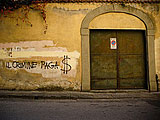Italy: All in the family
By Eric J Lyman for ISN
For more than a generation, Italy's strategy for confronting organized crime in the country's poorer southern regions has revolved around infiltrating the ranks of the various groups and cultivating informers from among existing members. But recent data shows that it is a tactic that has begun to lose its effectiveness.
Italian law enforcement has in recent years captured several high-level mob bosses, and the number of jailed organized crime figures continues to grow. Local businesses in many crime-ridden areas have taken the bold step of refusing to pay protection money - the pizzo - that has bled them dry for decades, while polls show that a weary public has historically low tolerance for crime groups.
But new statistics show that despite all that, the five major Italian crime organizations - the high-profile Sicilian Mafia and the Camorra in Naples, the enigmatic 'Ndrangheta in Calabria, the smaller Sacra Corona Unita in Apulia, and Basilicata's upstart Basilischi - are enjoying unprecedented levels of economic success even as the Italian economy slows to a crawl.
According to the think tank Eurispes, organized crime in Italy last year took in a staggering €126 billion (US$161 billion) - equivalent to nearly a tenth of Italy's gross domestic product and 40 percent more than the €90 billion they took in the previous year.
"By almost any measure, it was a banner year for these organizations," Gian Maria Fara, the president of Eurispes, told ISN Security Watch.
Almost half of the total amount (€59 billion) comes from drug trafficking, but protection fees, prostitution, extortion and arms trafficking are all major sources of income. None of this is too surprising. But what may be startling is that the strongest and healthiest of all the organizations is Calabria's 'Ndrangheta.
With a difficult-to-pronounce name said to derive from the ancient Greek word for "virtue" and "heroism," the 'Ndrangheta inhabit the tip of the Italian boot. The most rural of the major Italian crime organizations, they do not have the centralized power structure headed by a "boss of bosses" other organizations traditionally have. They rely instead on family units that interact, even from such far-flung places as Australia, South America, and Eastern Europe.
The secretive 'Ndrangheta are also the most closed and most family oriented of the groups - both facts that make it harder for traditional law enforcement methods to work.
"It's very hard to find an informer for the 'Ndrangheta because they're all related," Fara said. "Someone taken into custody is much less likely to become an informer if that means he'd end up informing on his cousin or brother. And it's just about impossible to infiltrate the groups, because these people have all known each other since childhood. You can't fake that."
The bad news for law enforcement is that the other organizations are starting to take moves from the 'Ndrangheta playbook. Partially because of infighting, which makes it more difficult for the new generation of bosses to consolidate power, and partially out of the need to close ranks as protection against informers and infiltrators, there is reason to believe that at least Sicily's Cosa Nostra and the Neapolitan Camorra are starting to evolve into less penetrable and increasingly decentralized organizations. The Basilischi, though the smallest of the five groups, already have a structure similar to the 'Ndrangheta.
Prime Minister Silvio Berlusconi has vowed to increase funding for law enforcement and to crack down on crime. But it's difficult to believe that a few extra police officers and some new equipment will help reverse such a deep-rooted trend.
In the end, the best strategy for solving Italy's organized crime problems may be simply addressing the country's other woes - political corruption and anemic economic growth.
It's no coincidence that all of the country's major crime networks exist south of Rome, in the country's beleaguered mezzogiorno, where political ineptitude and a dearth of economic activity are endemic. Organized crime has never thrived in vibrant, wealthy, and well-run northern cities like Bologna, Parma or Verona.
Sociologists argue that the issue of corruption and poverty, as it relates to crime in the mezzogiorno, is a chicken-and-egg situation: Are these areas corrupt and poor because of the mob, or does the mob exist because they are corrupt and poor? Whichever the case, it's clear that the two sides go hand in hand. And the best way to get rid of one may be to eliminate the other.

